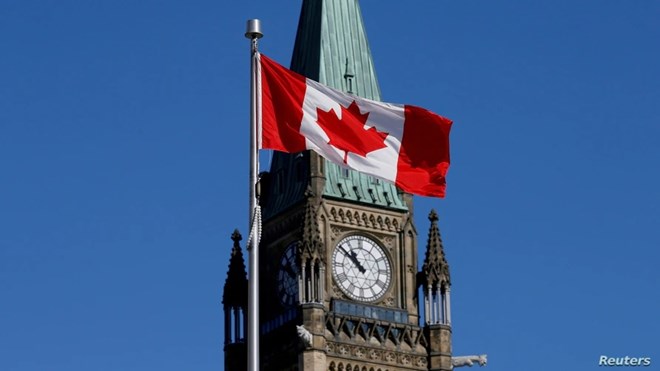
Wednesday September 8, 2021
By Jay Heisler

FILE - A Canadian flag flies in front of the Peace Tower on Parliament Hill in Ottawa, Ontario, March 22, 2017.
Hawa Yahia Mire, a candidate for parliament in Canada's September 20 election, is blazing a trail that she hopes other Somali Canadian women will follow.
"We are both thriving and struggling in a new place," Mire said in an interview about Canada's growing Somali immigrant community.
Mire, who is running on behalf of the leftist New Democratic Party in a Toronto-area constituency, is one of two Somali-born immigrants seeking seats for the first time in the next parliament. The other is Hibo Mohamed, who is representing Prime Minister Justin Trudeau's centrist Liberal Party in a constituency in the western province of Alberta.
Neither would be the first Somali Canadian to make it into parliament. That honor has gone to Ahmed Hussen, currently a Cabinet minister in the Trudeau government dealing with families, children and social development, and the incumbent in the Toronto seat being contested by Mire. He is seeking reelection.
Another Somali Canadian, former refugee Ali Duale was elected on behalf of the Liberal Party just weeks ago to the provincial legislature in the Atlantic coastal province of Nova Scotia.
And Somali-born Faisal Hassan sits in the provincial legislature of Ontario, which includes the national capital city of Ottawa, where the Somali diaspora has become one of the most robust immigrant groups.
"For many of us who were born in Somalia but came here to Canada as children, we've known a rich cultural heritage inside of a new home," Mire told VOA when asked about what she hopes to accomplish if she is elected.
"There are many young people in Canada working hard to build themselves a future, a future that is made challenging by unaffordable housing, low employment opportunities and challenges around how Somalis are perceived in this country and others across the world."
Despite Canada's reputation as a country that welcomes immigrants, Somali-born residents are often victims of xenophobic anti-immigrant sentiment, and, Mire said, politics is not always a welcoming place for women of color.
"As someone new to politics, I'm actively aware that this system was not designed for people like me — for women, for immigrants, for Black people in general," Mire said. "As a result, I feel, politics hasn't always been able to adequately serve our communities. I'm excited to do this work because that needs to change — and I'm hoping to be part of that change."
Somali immigrants have also found success in politics in the United States.
"While serving as the U.S. ambassador to Somalia, I visited many towns and cities in the United States," said former U.S. Ambassador to Somalia Stephen Schwartz in an interview. "I was always struck by the leadership roles many Somali Americans have obtained and the respect they had from local officials."
Mire said Ilhan Omar, a member of the U.S. Congress from Minnesota and perhaps the most widely known Somali American politician, has been an inspiration for her.
"I am learning from leaders who have come before me and broken that mold, people like Ilhan Omar. I know from my brief time already there is still so much work to do," she said.
But politics is not the only avenue to success in a new country, said Osman Ali, executive director of the Somali Canadian Association of Etobicoke, who described Canada as "a beautiful county" and "a nice place to raise children."
"If you are young, strong and willing to work, every country loves you. Not only Canada," Ali told VOA.
"What I suggest to you is, you have to think of what you bring to Canada. If you don't have any trade, learn something. Learn how to drive; get your driver's license. Learn something."
Ali added: "So if you do not have enough education, you can contribute to the labor side of Canada. If you have education, improve yourself. Improve your English language. Improve your computer skills."